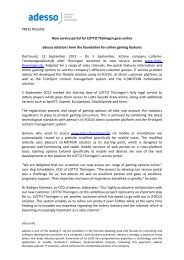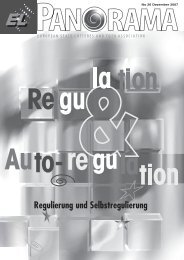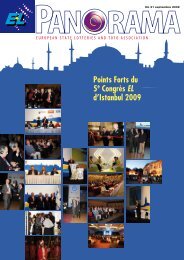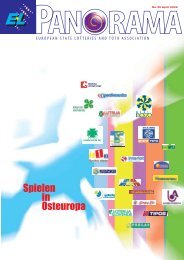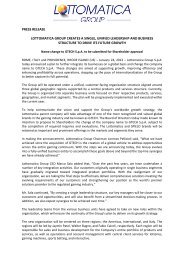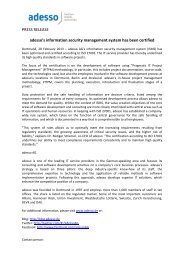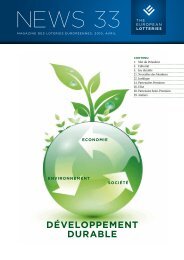EUROPEAN STATE LOTTERIES AND TOTO ASSOCIATION
EUROPEAN STATE LOTTERIES AND TOTO ASSOCIATION
EUROPEAN STATE LOTTERIES AND TOTO ASSOCIATION
Create successful ePaper yourself
Turn your PDF publications into a flip-book with our unique Google optimized e-Paper software.
In several speeches I did mention that since<br />
1994 until 2007 the European Court of Justice<br />
did rule in 14 preliminary cases on gambling<br />
services. In 2008 the same European<br />
Court has already received 14 new preliminary<br />
referrals. As such this proves that the<br />
legal disputes surrounding gambling in the<br />
EU are creating the need for regulatory solutions.<br />
In his opinion in the Placanica case, the Advocate<br />
General mentioned on the last page<br />
of his opinion that the Member States did<br />
already miss several opportunities to regulate<br />
gambling services at EU level. Although<br />
the comment is surprising and unfair, considering<br />
the inadequacy of the solutions<br />
proposed by the Commission, it shows that<br />
the Court is not willing to become the final<br />
arbitrator in what is becoming an increasingly<br />
difficult political problem.<br />
Notwithstanding this, one has to admit that<br />
the European Court has acted in this area<br />
with great respect for the sensitivities and<br />
problems at stake. The Court, as always,<br />
took up its own responsibility as far as the<br />
Court could go and did substantially contribute<br />
to create conditions allowing the<br />
Member States to understand what is possible<br />
within the actual context of the Treaty.<br />
From Schindler to Placanica the Court has<br />
designed the legal framework for gambling<br />
services under the Treaty and the limits<br />
thereof.<br />
The Treaty as such does indeed not provide<br />
for full answers to the complexity of<br />
the gambling issues and the Court understands<br />
this. The Portuguese internet gambling<br />
case did show how far reaching the<br />
difficulties are. None of the Member States<br />
16<br />
Where does Europe (want to) go?<br />
By Philippe Vlaemminck, EL Legal Adviser<br />
present, and there were many intervening,<br />
nor the Commission does want the gambling<br />
market to be driven by market forces.<br />
Already in Schindler, the Advocate General<br />
explained in a very high level and well argued<br />
opinion that applying market rules to<br />
gambling services will not lead to a better<br />
allocation of resources as aimed at by the<br />
Treaty.<br />
Today, however, the institutional crisis is<br />
deep. The Commissioner in charge of Internal<br />
Market questions does not want to<br />
do anything else than to apply the Treaty<br />
to gambling services. This could undermine<br />
the structures set up by the Member States<br />
to respond to addiction and criminal problems<br />
clearly connected to gambling. He has<br />
initiated infringement cases against an increasing<br />
number of Member States, proving<br />
by this that there is no simple legal problem,<br />
but rather a very serious political problem.<br />
The infringement cases will not bring solutions,<br />
but rather increase the problems.<br />
Strangely enough the Commissioner for<br />
Internal Market does not want to take up<br />
the political challenge, although the awareness<br />
of the problem is growing inside the<br />
Commission that, as the President of the<br />
Commission is stating, “a friendly solution”<br />
must be searched together with the Member<br />
States.<br />
The other institutions, who did refuse the<br />
earlier inadequate solutions (E-commerce<br />
Directive, Services Directive) proposed by<br />
the Commission, do take up their political<br />
responsibility although legally they don’t<br />
have the right of initiative.<br />
Indeed, following a meeting of the Government<br />
Agents to the European Court on July,<br />
10, 2007, the Member States decided to start<br />
a dialogue on this matter. It took up until the<br />
current French Presidency before the idea<br />
was implemented through the “Services<br />
and Establishment Working Group” of the<br />
Council. During the Competitiveness Council<br />
in December 2008 the French Presidency<br />
wants to report on the discussions in this<br />
Working Group. Surprisingly during the first<br />
meeting in July the Commissioner on Internal<br />
Market denied even to participate in this<br />
dialogue with the Member States instituted<br />
by the French Presidency. Let’s hope that<br />
this changes and that the Commission Services,<br />
who have over the years acquired a<br />
substantial knowledge of the problems and<br />
P AN RAMA<br />
Legal<br />
understand the sensitivities, can participate<br />
and contribute to this dialogue. This<br />
is indeed the only way to come to terms in<br />
this difficult area. The discussion although<br />
strongly focused on the problems of the online<br />
gambling market, will cover all aspects<br />
of gambling. A questionnaire has been sent<br />
to all Member States who are expected to<br />
provide input by 12 September.<br />
Also the European Parliament wants to<br />
contribute to a better solution. Indeed also<br />
the Parliament did initially reject the proposed<br />
solutions of the Commission, but is<br />
aware that the Treaty as such does not provide<br />
the solution. During the debate on the<br />
White Paper on Sport, it became clear that<br />
the European Parliament acknowledges the<br />
important role and contribution of Lotteries<br />
to the European sport model based upon<br />
amateur and grass root sports.<br />
In September, the IMCO Committee of the<br />
European Parliament wants to address the<br />
question of gambling in an own initiative report.<br />
Although initially the European Parliament<br />
was considering to look into the questions<br />
of the online gambling market only,<br />
the expectations are that the Parliament<br />
will take into consideration all consumer related<br />
aspects as well as the public order elements<br />
of crime prevention. The Parliament<br />
also wants to order a short study on some<br />
aspects of the gambling market to prepare<br />
its own work.<br />
Both initiatives can only be welcomed and<br />
show how both institutions take up their political<br />
responsibility to find proper political<br />
and regulatory answers, if necessary under<br />
secondary EU law, something that the European<br />
Court could as such not do.<br />
Today it is clear that a single Member State<br />
cannot provide all answers to regulate properly<br />
the gambling sector. The principle of<br />
subsidiarity as outlined in the Protocol of<br />
the Amsterdam Treaty does therefore require<br />
the European Union to look for the essential<br />
cross border aspects of the problem.<br />
This is what has to be done. The coming<br />
months will show us where Europe wants<br />
to go. European Lotteries can substantially<br />
contribute, as an experienced think tank<br />
and as the representative of the vast majority<br />
of the gambling sector, to the fact finding<br />
and the regulatory solutions.




